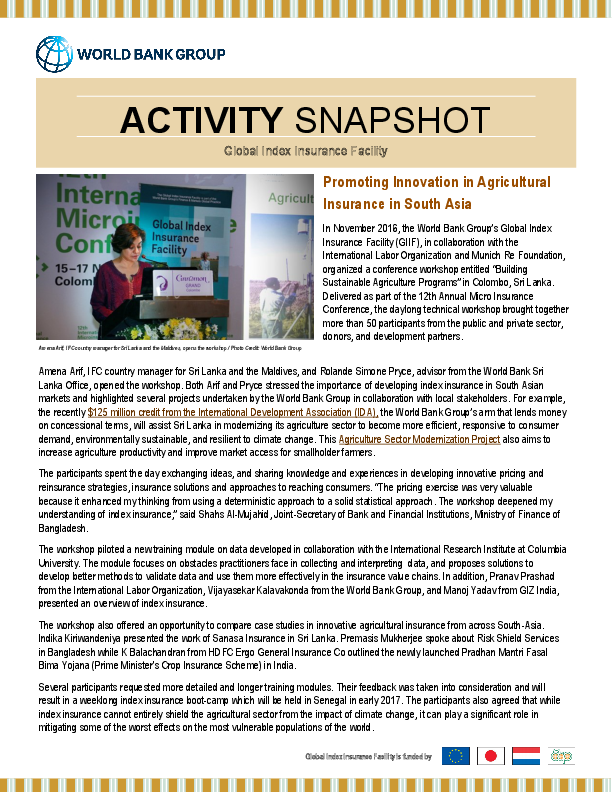Promoting Innovation in Agricultural Insurance in South Asia

In November 2016, the World Bank Group’s Global Index Insurance Facility (GIIF), in collaboration with the International Labor Organization and Munich Re Foundation, organized a conference workshop entitled “Building Sustainable Agriculture Programs” in Colombo, Sri Lanka. Delivered as part of the 12th Annual Micro Insurance Conference, the daylong technical workshop brought together more than 50 participants from the public and private sector, donors, and development partners.
Amena Arif, IFC country manager for Sri Lanka and the Maldives, and Rolande Simone Pryce, advisor from the World Bank Sri Lanka Office, opened the workshop. Both Arif and Pryce stressed the importance of developing index insurance in South Asian markets and highlighted several projects undertaken by the World Bank Group in collaboration with local stakeholders. For example, the recently $125 million credit from the International Development Association (IDA), the World Bank Group’s arm that lends money on concessional terms, will assist Sri Lanka in modernizing its agriculture sector to become more efficient, responsive to consumer demand, environmentally sustainable, and resilient to climate change. This Agriculture Sector Modernization Project also aims to increase agriculture productivity and improve market access for smallholder farmers.
The participants spent the day exchanging ideas, and sharing knowledge and experiences in developing innovative pricing and reinsurance strategies, insurance solutions and approaches to reaching consumers. “The pricing exercise was very valuable because it enhanced my thinking from using a deterministic approach to a solid statistical approach. The workshop deepened my understanding of index insurance,” said Shahs Al-Mujahid, Joint-Secretary of Bank and Financial Institutions, Ministry of Finance of Bangladesh.
The workshop piloted a new training module on data developed in collaboration with the International Research Institute at Columbia University. The module focuses on obstacles practitioners face in collecting and interpreting data, and proposes solutions to develop better methods to validate data and use them more effectively in the insurance value chains. In addition, Pranav Prashad from the International Labor Organization, Vijayasekar Kalavakonda from the World Bank Group, and Manoj Yadav from GIZ India, presented an overview of index insurance.
The workshop also offered an opportunity to compare case studies in innovative agricultural insurance from across South-Asia. Indika Kiriwandeniya presented the work of Sanasa Insurance in Sri Lanka. Premasis Mukherjee spoke about Risk Shield Services in Bangladesh while K Balachandran from HDFC Ergo General Insurance Co outlined the newly launched Pradhan Mantri Fasal Bima Yojana (Prime Minister's Crop Insurance Scheme) in India.
Several participants requested more detailed and longer training modules. Their feedback was taken into consideration and will result in a weeklong index insurance boot-camp which will be held in Senegal in early 2017. The participants also agreed that while index insurance cannot entirely shield the agricultural sector from the impact of climate change, it can play a significant role in mitigating some of the worst effects on the most vulnerable populations of the world.
